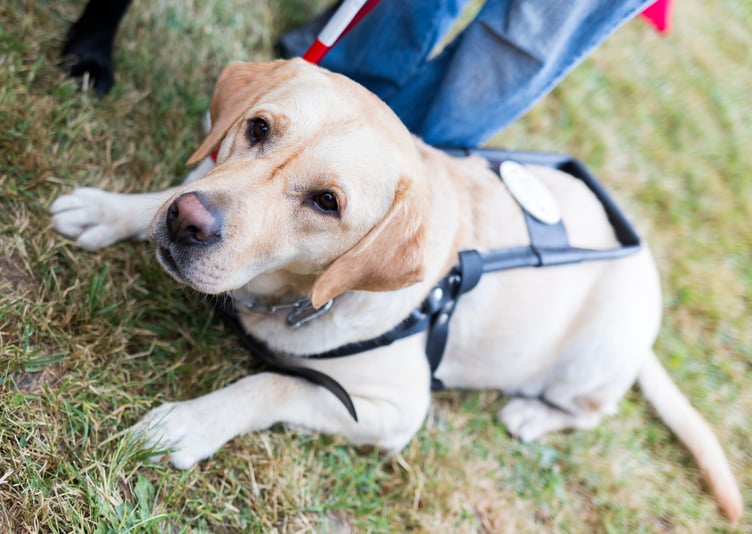
CrossCheck’s main office is situated in the northern California city of Petaluma near two of the most renowned service-animal providers in the country: Guide Dogs for the Blind in San Rafael and Canine Companions for Independence in Santa Rosa. Both are longstanding members of the community and both have placed thousands of dogs throughout North America.
A much smaller operation, The Hearing Dog Program trains service animals for use in California and Nevada from its nearby headquarters in San Francisco.
Coincidentally — and with an edgy stroke perhaps inspired by Pit Bulls and Parolees, the Animal Planet series about a New Orleans dog shelter — a fourth group appeared on the local scene in 2014. Inmates serving time for non-violent crimes at the North County Detention Facility now train a small pack of dogs to help disabled people. The Sonoma County program works in cooperation with the Assistance Dog Institute at Bergin University of Canine Studies in Rohnert Park.
Guide Dogs for the Blind
Founded in 1942, Guide Dogs for the Blind (GDB) is the largest service-animal program in the country, providing comprehensive training and support for graduates. GDB is a nonprofit, tax-exempt organization funded entirely by private donations. GDB has two training facilities: one at its headquarters and a second near Portland, Oregon.
GDB is assisted by more than 2,000 puppy-raising families living in several Western states. More than 14,000 teams have graduated to date, and there are approximately 2,200 active guide dog teams currently in the field.
Services are provided to students from the US and Canada at no cost to them with the help of staff and volunteers. To be eligible, students must be legally blind, able to travel independently, and suited to work with a dog. Most classes graduating from the two-week training program are composed of six to eight students.
GDB breeds and trains Labrador Retrievers, Golden Retrievers and Lab/Golden crosses from its own purebred stock. The animals are individually selected for their temperament, intelligence and health.
Canine Companions for Independence
Canine Companions for Independence (CCI) has provided assistance dogs to the disabled since it was founded in 1975. The organization, six regional training centers and the Santa Rosa headquarters, is mostly funded by individuals, corporations and foundations.
CCI provides four types of assistance:
- Service Teams perform daily tasks for adults with physical disabilities
- Hearing Teams alert the deaf and hard of hearing to important sounds
- Skilled Companion Teams enhance the independence of those with physical, cognitive or developmental disabilities
- Facility Teams work with a professional in visitation, education or healthcare settings
Dogs are typically awarded to people who can most benefit from the services. Individuals working for groups providing physical or mental health care are also eligible to apply. Successful candidate teams must complete a two-week course at the regional center best suited to preparing them for a life together.
Puppies are raised by volunteers who take them to puppy classes and teach them house manners and public etiquette. They begin formal training at a regional center when they are old enough. The breeding program resembles the one used by GDB.
The Hearing Dog Program
The Hearing Dog Program (HDP) provides canine assistance to people with hearing loss by training dogs to alert the deaf and hard of hearing to important sounds such as alarms, telephones and doorbells.
Many of the dogs selected for the program come from shelters and rescue groups in California including the Central California SPCA in Fresno. The group is also the beneficiary of "career change" dogs from Guide Dogs for the Blind who did not make the cut in that realm.
Individuals with hearing loss from California and Nevada are welcome to apply for a hearing dog. Those accepted must agree to provide a safe and secure home for their dog and demonstrate an ongoing commitment to their dog's well being.
Making the correct match between client and dog improves the chances of a successful relationship. Eventually, their strong bond will encourage the animal to excel even further in a service capacity as the relationship becomes a life-changing experience for both.
North County Detention Facility
A handful of inmates have made the cut as pro tem dog trainers at the North County Detention Facility in Santa Rosa. Two Labrador retrievers, Otis and Neville, were “released from custody” after serving eight months under the 24-7 supervision of their inmate handlers in a dormitory-like setting. The dogs entered the minimum-security facility as three-month-old puppies where they learned how to “open doors and cabinets, retrieve items and turn on light switches.” They have been returned to the Assistance Dog Institute for advanced training, but two new canine recruits will soon take their place among the detained.
The program was devised by industry innovator Bonnie Bergin, the founder of Bergin University of Canine Studies as well as Canine Companions for Independence.
These four Bay Area orgs are committed to the elite training of service animals that embellishes the quality of life for disabled Americans. CrossCheck appreciates its geographic position among them while engaging in specialized training of its own.
Veterinary offices opting-in to our VET-RDC service become part of a select group receiving the finest customer care in the payments industry. Before the ink even dries on a new agreement, a handful of CrossCheck departments are working behind the scenes to insure that the services are fully operational in the shortest amount of time. In particular, Customer Service handles queries about a variety of needs and offers ongoing merchant training 24/7/365 including major holidays.
VET-RDC can help your veterinary office process more checks in a fast, paperless manner that will help increase sales. The program includes online Check Guarantee and account monitoring as well as Multiple Check, a component especially useful when pet parents face expensive emergency bills. Customers write 2-4 checks to be deposited over a 30-day period according to a mutually-beneficial schedule. Download our free ebook now and learn how it can help your veterinary office.



